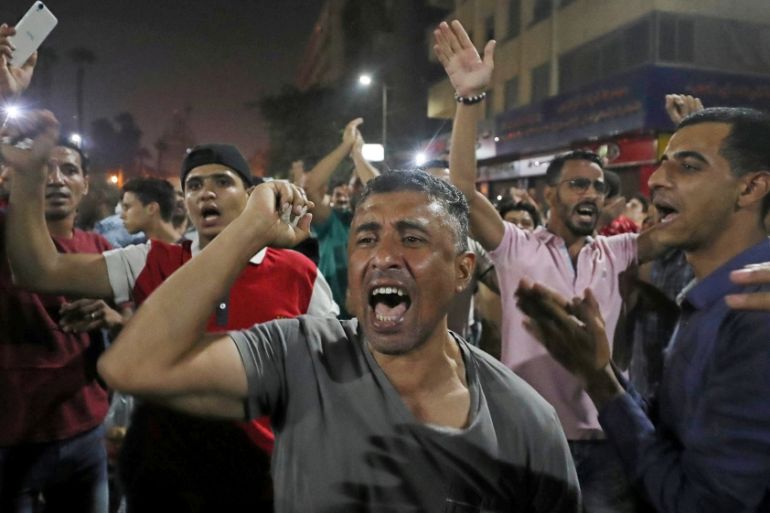CPJ calls for release of jailed Egyptian journalists
At least 6 journalists have been arrested for covering anti-government protests that erupted on September 19.

A media watchdog has called on Egyptian authorities to immediately release journalists Alaa Abdelfattah, Nasser Abdelhafez, Engi Abdel Wahab and three others arrested for reporting on the recent protests against President Abdel Fattah el-Sisi.
In a statement published on Monday, the US-based Committee to Protect Journalists (CPJ) noted that at least six journalists have been arrested since the anti-government protests started on September 19.
Keep reading
list of 4 itemsTurkey and Egypt call for ceasefire in Gaza
Turkey’s Erdogan, Egypt’s Sisi meet in Cairo
Turkey’s Erdogan arrives in Egypt for first visit in more than a decade
“Egyptian authorities must stop arresting journalists on charges of spreading false news or joining a banned group; those charges have become nothing more than thin excuses to arrest journalists for their coverage,” said CPJ’s Middle East and North Africa Program Coordinator Sherif Mansour.
“Taking even more vindictive measures against journalists will not help Egypt with its already stained record against the media.”
Abdelfattah, Abdelhafez and Wahab were arrested on charges of supporting a banned group and spreading false news, CPJ wrote.
On September 20, the statement said, police arrested Abdelhafez, an arts columnist for the government-owned Akhbar Al-Youm newspaper, after he allegedly took photos during protests at Tahrir Square.
On the same day, police also arrested Abdel Wahab, a reporter at the privately-owned Al-Masry Al-Youm newspaper, while she was covering anti-government protests in Cairo.
A few days later, a court ordered for them to be held in pretrial detention for 15 days.
Most recently on Sunday, National Security Agency officers arrested Abdelfattah, a blogger and columnist at Mada Masr, an independent Egyptian news website, while he was at his probation cell, CPJ wrote.
The next day, a prosecutor ordered Abdelfattah to be held for 15 days pending trial on the same charges of supporting a banned group and spreading false news.
Abdelfattah had previously served a five-year prison sentence on anti-state charges and was released in March on the condition that he spend every night in police custody for the following five years, according to CPJ’s research.
Blocking news websites
Thousands of pro-democracy protesters marched in cities across Egypt over the weekend of September 19, the first time in years, demanding the resignation of President el-Sisi.
Nearly 2,000 people were arrested in one week, according to rights groups.
Police have not disclosed the whereabouts of the journalists, according to reports.
CPJ’s emails to Egypt’s Supreme Council for Media Regulation, State Information Service, and Prosecutor General’s Office about the arrests did not receive any responses, it noted.
CPJ wrote that during the protests, Egyptians reported difficulty accessing Facebook Messenger and news websites such as the BBC, Al Jazeera, US-funded Al-Hurra and the independent Egyptian news website Mada Masr, according to reports by NetBlocks, an organisation that tracks internet shutdowns and news reports.
Makram Mohamed Ahmed, the head of Egypt’s Supreme Council for Media Regulation told government-owned outlet Ahram Online that the BBC and other news websites may have been blocked because of their “inaccurate” coverage of the protests, CPJ wrote.